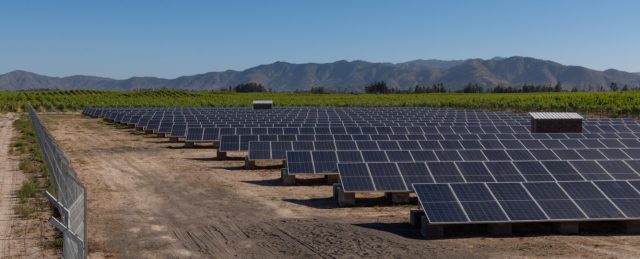Cono Sur takes forward steps towards carbon neutrality
By db staff writerChilean winery Cono Sur has shown how it has reduced its carbon footprint considerably since measuring and managing its emissions and offsetting those created by third parties.

The wine brand, which is well known for its eco-credentials, began by measuring its carbon footprint to quantify the impact that its activity on climate change before detecting the actions that contributed to an increase in greenhouse gas emissions.
According to the winery, having this measure in place allows it to easily manage its actions to decrease its carbon footprint, also achieving a more efficient use of resources.
The emissions, which have been registered by Cono Sur Winery, are verified by an accredited third party and its latest measurement corresponded to the Société Générale de Surveillance (SGS), under the Carbon Footprint Assessment protocol, from Carboneutral.
Speaking about the forward steps it has been making on its carbon neutral journey, the winery highlighted how it works each year to lower its carbon footprint and explained that it offsets 97,8% of the emissions generated.
Some of the actions the winery took include: Reduction in the volume of fuel use in the vineyards and warehouse; Replacement of agricultural machinery; Acquisition of less HP machinery to use on less heavier jobs.
Cono Sur senior brand manager Antonia Feres Hoppe said: “As an example, as a measure to reduce greenhouse gas emissions, we switched our liquefied petroleum gas forklifts for electric ones. As a result, a 42,3% reduction in consumption could be noted, expecting to achieve a 90% decrease in the short term.”
Feres Hoppe added: “The use of clean energy and the reduction of our environmental impact have always been at the core of Cono Sur Winery philosophy. With the aim of reducing our greenhouse gas emissions and our electrical cost in some of our locations, we started an assessment of technical requirements and viability of implementing solar panels in our estates.”

Over the last years, Cono Sur has implemented solar panels on several locations from 2017 onwards. To this day, it has five photovoltaic installations located in its properties in El Encanto (Aconcagua), Campo Lindo (Leyda), La Espuela (Maule), Las Lomas and Santa Elisa (Colchagua).
Feres Hoppe also revealed how, during the 2022 harvest, “the photovoltaic plant installed on the roof of the winery began its operation, with an installed capacity of 600 kW” and also hinted that there are also plans afoot to “build a new plant in Mulchen Vineyard” this year.
Taking into account the raft of changes made to improve efficiency and become carbon neutral, Cono Sur has seen an improvement in efficiency of 38%, which implies lower electricity consumption and lower greenhouse gas emissions.
As well as reusing irrigation water, Cono Sur has also made a reduction in executive flights, and a constant reduction in the weight of bottles, which has led to a decrease in the amount of glass per litre of wine and weight transported.
Cono Sur Winery can also attest that it offsets the emissions generated by the transportation (ground and water) of Cono Sur and Isla Negra products by acquiring carbon credits to projects that reduce greenhouse gases, which is validated by the Natural Capital Partners company, who issues the CarbonNeutral Delivery certification.
During the last measured period, from June 2021-May 2022, Cono Sur ‘s transport of the wine with Cono Sur and Isla Negra brand stood at 11.671 Ton CO2 , from which it offset 97,8%, through two projects, namely ‘Cuel Wind Power Portfolio’ based in Chile and ‘Wind Power Portfolio, based in Guatemala’.
Additionally, Cono Sur Winery is participating in the Science Based Target (SBT) initiative, which states that science-based targets provide a clearly defined a pathway for companies to reduce their Greenhouse gas emissions.
The initiative helps to prevent the worst impacts of climate change and safeguard future development.
Related news
Freixenet celebrates Mother's Day with multi-channel activations
Why the wine rarely vanishes – the truth about cooking with alcohol
